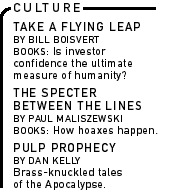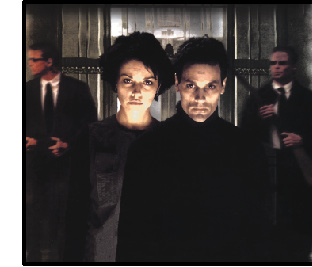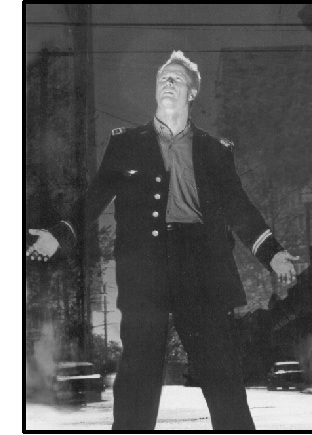 
|

|

|

|
| |
 |
|
|
Back in the 1830s, an upstate New York preacher and former atheist by the name of William Miller announced that Jesus was coming on a white horse to judge the living and the dead--and soon. Miller's faith in biblical prophecy was so implicit he provided an exact date for Christ's return: April 3, 1843. Rather than locking the good reverend in a rubber room, Miller's congregation sold all they owned, donned white sheets and waited in graveyards for the Lord's debut. Two years and several date changes later, the Millerites realized the Son o' God wasn't showing up until He was damn good and ready. Many of Miller's flock disavowed the erroneous preacher, but few rejected his belief system--dispensationalism--which claims the end times are foreordained in the Bible. Many, in fact, established branches of what later became the Adventist Church. Indeed, the Millerites' single-mindedness stands as a stirring tribute to the indomitability of the human spirit, and a chilling testament to the blithe heedlessness of the "saved." The Millerites are long gone, but the millenarian id soldiers on--perhaps nowhere more
Left Behind's success is made more impressive by the way it created its own action/adventure genre out of a part of the Bible assiduously avoided--at least in a nonecumenical way--by touchy Hollywood types: the very disturbing Book of Revelation (the Apocalypse of St. John to you Catholics). As raw dramatic material you could do worse. Whether the result of divine inspiration or too much ergot in the Evangelist's bread, Revelation throbs with fantastical visions of vengeful angelic hosts, gouts of blood, a very pissed-off Jehovah, and the ultimate battle between good and evil. (Tip: Don't bet on Satan.) The Left Behind novels follow their scriptural model more or less accurately and with a contemporary bent, beginning with the Rapture, that time in Christian eschatology when the Lord gathers up the faithful and teleports them to heaven. Why does He do this? Well, let's say the next seven years, known as Tribulation, is the shitstorm of all time. Tribulation is marked by the appearance and rise of Antichrist, whose management agenda reads like Dr. Bronner's soap label, with the establishment of a one-world government and all-one-world-faith religion. Antichrist serves as a sort of global potentate, spiritual leader and deity all in one. This sits ill with God, naturally, who cherishes His own exclusive franchise. Thus, the Four Horsemen blight the earth with war, famine, pestilence, man-headed locusts and other unpleasantness. Throughout, several characters bump into one another until Jesus wins. One appealing feature of Left Behind is its Howard Zinn-like approach to the
Meanwhile, virile world-class journalist Cameron "Buck" Williams tries to make sense of it all. Thirty years old, yet possessed of face time and an expense account that would make the 60 Minutes staff weep with envy, Buck stumbles into several Revelation highlights, not the least being Antichrist's rapid rise from minor pol in the Romanian parliament to U.N. Pontifex Maximus. Buck eventually meets Rayford and Chloe, and all come under the prophetic tutelage of Pastor Bruce Barnes, a deluded fool shocked to be left behind while his congregation teleported to heaven. Eventually, the four form Tribulation Force, a ballsy, high-powered prayer group driven to thwart Antichrist's plans for world conquest. Well, kinda. If the meek are supposed to inherit the earth, it just wouldn't do to have Tribulation Force strangling security guards with piano wire. So what exactly do they do? Well, they pray a lot. Boy howdy, do they pray! Sometimes they read the Bible too, then tell each other how great it is to pray a lot and read the Bible. Then they pray some more. They also play duck-and-cover with Antichrist's Global Community government (the United Nations' new name) and Enigma Babylon One World Faith (the one-world religion--Antichrist doesn't have a knack for catchy names like Unisys). They also slurp up as much prophecy as they can, making up for time lost while evading testimonials and tongues-speaking from now-raptured friends and family. As for Antichrist, he's a gregarious fellow who resembles Today Show weatherman Al Roker. No, not really. Antichrist is an oleaginously sexy Romanian named Nicolae Carpathia. How do we know he is Antichrist? Well, he dresses in black Armani and is as unctuous as a Junior Achiever on a job interview. He also achieves world power in vaguely described ways, has premarital sex and exterminates underlings when they fail him, á la Dr. No. It's worth mentioning that Antichrist is described as resembling a young version of Hollywood liberal Robert Redford. You may be asking yourself how, aside from divine intervention, Left Behind has worked its way into the mainstream. Tyndale's marketers ascribe much of the series' success to word of mouth. Joe Evangelist, perhaps feeling left out of water cooler conversations about the tawdry brilliance of Grisham, Clancy and King, now has a page-turner to recommend to his workmates--something more rip-roaring and enticing than the Pauline letters, that is. Soft-pedaling the evangelism without disregarding Christianity's importance to the plot line, and cranking up the cartoonish action, Left Behind attracts readers who may not otherwise read Christian fiction, assuming they could even find it at Wal-Mart or Barnes & Noble. True, the popularity of The X-Files and the fleeting Y2K hubbub--not to mention fears of melting Arctic ice, expanding ozone holes and other premonitions of world-death--belie a sort of cultural gentrification of what used to be fringe preoccupations. Left Behind takes this a bit further, appealing to our apocalyptic vanity. After a fashion, it's flattering to imagine we are the last, worst generation. LaHaye and Jenkins play to these conceits. As evangelicals they must. We are no longer the yokels of 300 years ago, fearful sinners in the hand of an angry God, or buying into the promise of eternal abundance. Instead, LaHaye and Jenkins put apocalyptical fantasy into a now-familiar narrative structure of the little guy vs. government/military/industrial complex evil. [Editor's note: For more on LaHaye's career in the culture wars, see "Right Wing Confidential," by Joel Bleifuss, August 21, 1994.] Left Behind's two main characters, Steele and Williams, cover both ends of the male reader spectrum, allowing powerless cubicle monkeys to envision themselves grappling with faceless, omnipotent evil. If they find Jesus along the way, so much the better. As literature, Left Behind rests south of the middlebrow--entertainment meant to be consumed in great gulps on the train ride to work. As Christian propaganda, however, it is brilliantly simple. Just as evangelical pamphleteer Jack Chick learned that his comix-style fundamentalist polemics drew more readers than text-heavy tracts, LaHaye and Jenkins realized the secular trappings of the action novel would suck in people who might be leery about opening a Bible on the bus. Yet unlike the psychopathological Chick comix, which present one and only one way to God, the Left Behind novels use a soft-sell approach--a sort of vanilla evangelism--to finding Christ. While fully convinced of their righteousness, LaHaye and Jenkins don't wish to offend and potentially lose any souls--at first. Evangelists realize that this is a fallen world, and consequently they have to be sneakier about their soul-winning. How to do it? As the 19th-century clergyman Rowland Hill put it, "The devil should not have all the best tunes." Like Christian rock and rap music, Left Behind is an assimilationist approach to godless American culture, though it does a better job of it. Most Christian rock stars, for example, possess a disturbingly sexless aura, denying what gives rock its potency. Left Behind, while not providing full frontal nudity and John Woo bloodfeasts, keeps the intrigue, action and (literally) virginal romance at a temperature reasonable for contemporary, nonreligious tastes. Ah, is that the scent of hypocrisy in the air? Not especially. Left Behind faithfully portrays white evangelical culture. None of the characters are turning away from much more than serendipitously successful careers (which, curiously, continue unimpeded for the first several books, with Antichrist allowing Steele and Williams to keep their jobs, so long as they tone down the testifying), and their previous wrongdoings amount to little more than lusting after flight attendants and having a little drinkypoo now and again. Buck Williams is even a 30-year-old virgin, for crying out loud. As the series progresses, however, fundamental fanaticism becomes the norm. Quoting modern dispensationalist/conspiracy theory throughout, through their portrayal of Antichrist, the authors display a heady distrust of one-world government, the United Nations, ecumenism, rampant Romanism and similar bugbears of the fringe religious right. You know. The kooks. But this is just fiction, remember? LaHaye and Jenkins are just
trying to tell a good story. They're not those kind of Christians.
Optimistic fatalism of a Millerite sort pervades the series, a sure
suspense-killer. When the end is preordained, and only two options--life
and death--are offered, why should anything else matter? Death doesn't
matter. Pain doesn't matter. Procreation doesn't matter. The world
is evaporating around them, friends are falling left and right,
and the human race is up to its ass in death, war, disease and privation.
That's okay, because Jesus is Lord, and Jesus will win. End of story:
page one, book one. In the Left Behind land of make-believe, optimistic
fatalism makes sense, but here in the real world, among the dispensationalists,
it's a frightening reality. Yes, those fellows who come knocking
at your door with a King James Bible and the fresh scent of Lysol
about them want to save your soul, but they're also convinced that
nothing else is worth saving in this sorry world since Jesus is
coming soon. Dan Kelly has written for The Baffler and Feral House, and is the author of a self-published essay collection, Cop Porn. His Web site, http://members.aol.com/mrcrash33/rectory.html, features more blasphemy.
|


